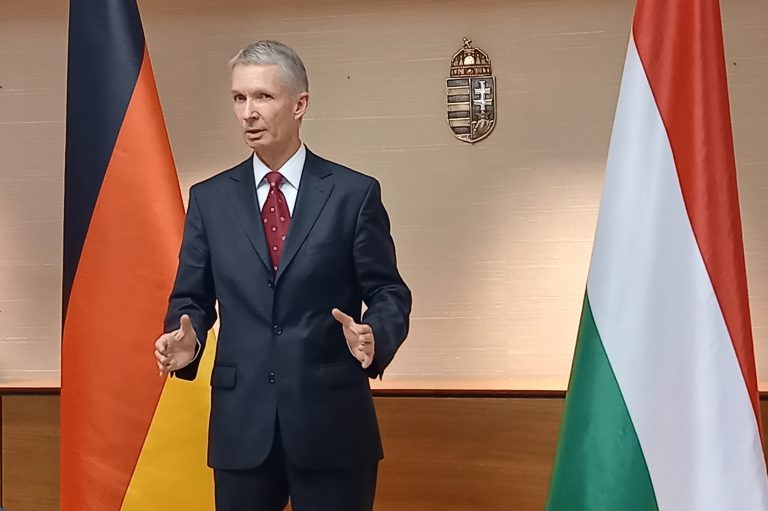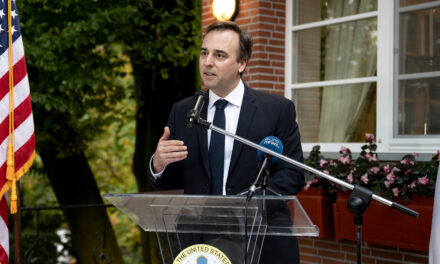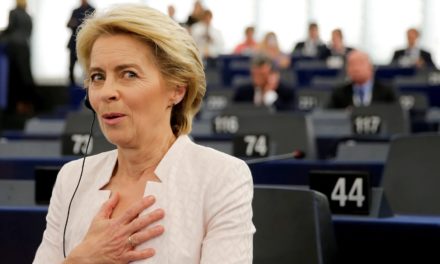Dr. Gerhard Papke was a representative of the FDP (Freie Demokratische Partei) in the state parliament of North Rhine-Westphalia from 2000 to 2017. The former leader of the faction of the FDP was the vice-president of the parliament of the same province until 2017, and since 2019 he has been the president of the German-Hungarian Society based in Berlin and Bonn. He was interviewed by a staff member of Hungary Today.
– You got involved in the work of the Company despite the fact that you have no personal connection with Hungary. What made you want to lead such an organization?
- Although I have no family roots in Hungary, when I was young I really admired the love of freedom of the Hungarian people, and I read a lot about the Hungarian national uprising of 1956. The eastern part of my German homeland was under communist rule. In 1956, the Hungarians showed that a dictatorship should never be accepted, and thus gave hope to the whole of Europe. And in 1989, the Hungarians took out the first brick from the wall dividing Germany. Many of my compatriots will never forget this for the Hungarians. I won't either.
And even today, we Germans can learn from the Hungarians. This is exactly what I am trying to convey in Germany.
- Do you really think that Germany should learn from Hungary?
- Let's start with national consciousness. The Hungarians are a history-conscious people, since during their thousand-year history they often had to fight for mere survival. That is why they want to preserve their culture and language. Their traditions give them strength and guidance.
In Germany, on the other hand, for years they have been trying to portray their own nation as something bad, because Hitler brought so much misfortune to Europe with the fascist reign of terror. But excessive, hateful nationalism and cosmopolitan national consciousness are two different things! Left-wing parties in Germany deliberately blur this distinction and label anyone who openly stands up for their country as a right-wing radical. This is also part of their strategy and partly explains the fear of Viktor Orbán in Berlin and Brussels.
- Do you think that the German political left is afraid of Viktor Orbán?
- Of course. Hungary is a relatively small country, but Hungary has become the opposite of everything that the left-green ideologues want. Hungarians defend the traditional family, which consists of a mother, a father and their children, and ignore all the trans madness that is being spread in Western Europe and the United States. The Hungarians protect Europe's borders, while the German government flies thousands of Afghans to Germany every month and opens ever wider borders to mass immigration. Hungarians defend a decentralized Europe of self-governing, free nations. They don't want an EU superstate telling them how to live and raise their children.
All of this is a challenge to the ruthless desire for power of the woke ideologues, who want to force Europe to follow their own direction through Brussels. That is why they declare Hungary an evil empire and constantly slander them with false claims. That's what I'm trying to fight against.
"With what result?"
"They constantly insult me, sometimes even threaten me." On the other hand, I also receive enormous encouragement. After every interview, people write to me and thank me for my pro-Hungarian position. They don't attack me so easily because I don't get paid for my commitment to Hungary, I work on a voluntary basis. As an old politician of the FDP, I cannot simply be put in the corner of the radical right. Hungary has many more friends in Germany than one would think by following the mainstream media. This experience is extremely motivating, as is the warmth of Germans of Hungarian origin, who suffer greatly from the fact that their old country is often treated unfairly in Germany.
- He says that Hungary has many friends in Germany, even though the German press often paints a distorted picture of Hungary.
– It should be seen that the media and politics in Germany are currently moving together better than decades before.
The classic parties and many media have shifted so far to the left that many Germans no longer find themselves in them.
There is growing interest in Hungary, because convictions that liberal-conservative people in Germany lack are becoming visible there. For more and more people, Hungary is beginning to embody the world that has been lost in Western Europe, including in Germany, even though many people yearn for it.
- Despite the pressure of the German government, your companies and industry are voting with their "feet"; are investing in Hungary in record numbers. Will this trend continue despite the dichotomy between trade and politics, or is there a risk that the disputes will affect business relations?
- It is really outrageous that some German politicians, such as Mrs. Katerina Barley, warn against investments in Hungary! However, German companies have completely different, fundamentally positive experiences in Hungary. And this close economic integration between our countries is a very stable basis for German-Hungarian friendship. Because people from the two countries work together in countless companies every day and learn to respect each other. This makes them immune to hate slogans!
- Most Hungarians still regard the Germans with affection as the people of Bach, Goethe or even Adenauer. That is why the hostility coming from the press and politics is so incomprehensible to us. But are Germans still the people of Rilke, Bach and Goethe, or are we living in the past?
- Johann Wolfgang von Goethe, the greatest German poet of all time, is just as indestructible as Sándor Petőfi. And the close coexistence of Germans and Hungarians is equally indestructible. I believe that in the foreseeable future we will again have a government in Germany that is committed to the deep friendship between our peoples. So let's look optimistically into the future!
Author: Dániel Deme













